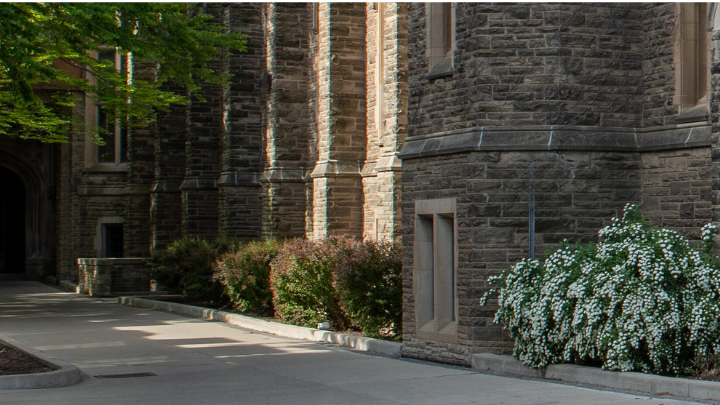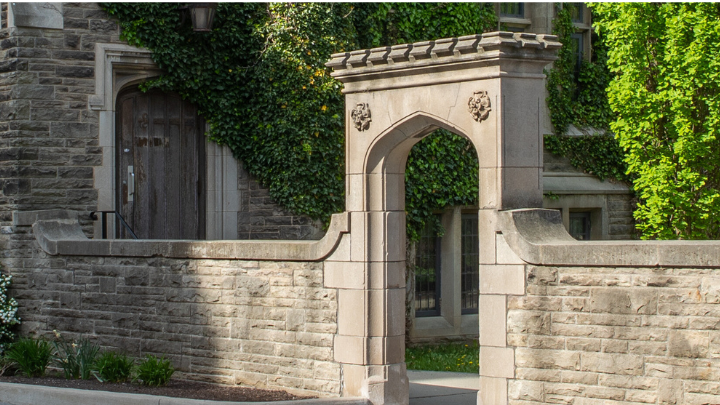PhD Political Science (Canadian Politics)
The study of Canadian politics explores all facets of the Canadian political system, from the institutional and constitutional foundations of Canada to important questions about Canadian political life.
In addition to a focus on core political institutions (such as Parliament, political parties, the electoral system, federalism, and the courts), the study of Canadian politics at McMaster enables students to explore key topics in Canadian politics including: Indigenous Politics & Indigenous-state Relations; Quebec Politics; Political Economy; Social Policy; the Politics of Migration & Citizenship; Regionalism; and the Politics of Gender, Race & Class.
Our faculty offers graduate instruction and supervision in many of the core foci of Canadian politics including the central institutions of the Canadian state, law & public policy, Indigenous politics, political behaviour and public opinion, social policy and the welfare state and Canadian political economy. Our faculty is methodologically diverse, with the ability to support and train students in qualitative, quantitative and mixed-method research.
We prepare students in the fields of theories and approaches to Canadian politics and policy, public administration, and Canada in comparative perspective. Our students can combine Canadian politics with comparative public policy or international relations with courses in related fields such as comparative politics, globalization and the internationalization of public policy. The program prepares graduates for working in Canadian universities and colleges, as well as federal, provincial and local public services.
Research Opportunities
Several faculty members in the department have funded research programs that provide potential opportunities for collaboration or research assistant positions for PhD students enrolled in political science. Potential PhD students with research interests or preparation that align with a faculty member’s research interests listed below should contact the relevant faculty member(s) as they prepare their applications for admission to the PhD program.
Faculty Specializing in Canadian Politics:
Adrienne Davidson: Federalism & Intergovernmental Relations, Social Policy (Early Years & Public Education), Indigenous Politics, Comparative Public Policy
Greg Flynn: Judicial Politics & Law, the Courts & Public Policy
Peter Graefe: Political Economy, Social Policy, Quebec Politics, Federalism & Intergovernmental Relations
Robert Innes: (cross-appointed with Indigenous Studies): Indigenous Studies, Indigenous-state Relations
Andrea Lawlor: (cross-appointed with the MPP in Digital Society): Media & Communication, the Courts & Public Policy, Judicial Politics & Law, Quantitative Methods
Stephen McBride: Political Economy, Trade & Globalization, Comparative Public Policy
In addition, several other faculty members have an interest in Canadian Politics:
Karen Bird: Diversity & Political Representation, Comparative Electoral Systems, Political Behaviour & Election Studies
Katherine Boothe: Health & Social Policy, Evidence & Policy Decision-making, Public Engagement
Maria Gintova: (cross-appointed with the MPP in Digital Society): Public Policy, Public Administration, Digital Technology & Public Policy
Clifton van der Linden: Political Behaviour & Election Studies, Digital Policy & Technology, Quantitative Methods & Computational Social Science
Program Information
Students are required to complete 18 units (6 half courses) of course work beyond the M.A. level.
They then prepare to write comprehensive examinations in their two fields – Comparative Politics and a second field drawn from one of Canadian Politics, Comparative Public Policy, International Relations or Political Theory. Exams are written in August of their first year and December of their second year.
Students also fulfill a language requirement to demonstrate their competency in a language other than English which is relevant to their research. This is normally done before the approval of the thesis proposal.
The remainder of the program involves preparing a thesis proposal, and then completing and defending the dissertation.
A thesis proposal will normally be submitted in April of the student’s second year. The thesis should normally be no more than 60,000 words long, and it is expected that the thesis will be finished about two years after the proposal is approved. Overall, then, full-time students are expected to take about four years to complete the program. Part-time students may take up to eight years to complete the degree but are encouraged to finish in less time.
Admission to the PhD program will normally require a Master’s degree in political science with an average of at least an A– (A minus).
Applicants are encouraged to contact faculty members in the Department of Political Science regarding potential supervision.
Required Application Documents:
Graduate Studies Online Application
Applicants are required to complete the Graduate Studies Online Application which opens October 1st each year. In addition to the online application, applicants must also submit the required documents listed below. Most required documents must be submitted through the online application.
Statement of Interest
- An electronic statement of interest (approximately 500 words, single or double-spaced, maximum of 1 page).
- The statement must be uploaded as a PDF attachment only through the online application system.
- Your statement of interest is a crucial element of the application process. Canadian Politics applicants should describe the analytical problem or question about the Canadian political system that their dissertation will pursue. Comparative Politics applicants should emphasize the comparative elements of their project compared. Comparative Public Policy applicants should highlight the comparative nature of their research and policy area which concerns them. International Relations applicants should identify the international, transnational or global elements of their research projects. Political Theory applicants should identify the philosophical traditions, concepts, or figures that they wish to study at the doctoral level.
- All applicants would benefit from indicating particular faculty members that overlap with their projects.
CV/Personal Resume
- An electronic copy of your CV/Resume must be uploaded as a PDF attachment through the online application system.
Official Academic Transcripts
- Upload a scan of ALL official university transcripts completed to date to the application system. Remember to include a copy of the transcript key/legend or scale from the transcript.
- Transcripts from institutions where you completed courses on Letter of Permission and/or as part of a Student Exchange Program must also be included.
- If the official language of instruction at your institution is not English, please include both the original language document and a certified English translation.
- DO NOT submit an unofficial transcript or a student record prints.
- If you receive an offer of admission further instructions will be given on how to submit formal official transcripts.
Academic Reference
- Three (3) confidential e-reference reports from instructors most familiar with your academic work.
- All referees are required to complete the e-Reference.
- You will be required to include contact information and an email address for each referee.
- The electronic referencing system will send an e-Reference request on your behalf.
English Language Proficiency (if applicable)
- If English is not your native language, an official copy of your English Language Proficiency score or other evidence of competency in English is required. Such applicants are required to supply this evidence as part of your application. Applicants whose university studies were complete at an institution where English is deemed the official language of instruction may be exempted from this requirement (an official letter from the institution is required).
- The English Proficiency exam must have been completed within 2 years of the application due date.
- This requirement must be met prior to an offer of admission. There will be no exceptions to the language requirement.
- The most common evidence is a score on the International English Language Testing System (IELTS) or the Test of English as a Foreign Language (TOEFL).
- TOEFL: minimum score is 92 (iBT-internet based), 237 (computer based) or 580 (paper based). The McMaster University TOEFL/TSE Institution Code is 0936 and the Department Code for Political Science is 89.
- IELTS (Academic): minimum overall score is 6.5, with at least 5.5 in each section.
NOTE: International students wishing to enter Canada on a study permit should also contact the nearest Canadian Embassy or Consulate for further information.
Application Fee
The system will charge a non-refundable application fee. Please have a valid credit card ready to pay the application fee. The fee will not be refunded or waived.
ANY LATE OR MISSING DOCUMENTS WILL DELAY YOUR APPLICATION AND NOT BE REVIEWED BY THE DEPARTMENT’S ADMISSION COMMITTEE.
Application Deadline:
January 14, 2024 (for September 2024 admission)
We do not offer a Winter (January) or Spring (May) start date.
The Ellen Louks Fairclough Scholarship in Political Science
The Ellen Louks Fairclough Memorial Scholarship in Political Science was established in 2004 to commemorate the life of The Right Honourable Ellen Louks Fairclough, P.C., C.C., F.CA., L.L.D., F.R.C.G.S., D.H., U.E., Canada’s first female federal cabinet minister and lifelong advocate for women’s rights. To be awarded to a student enrolled in a graduate program in Political Science who holds an Ontario Graduate Scholarship. Preference will be given to a student with an interest in Canadian public policy.
The Political Science Travel Grant
To support research and professional development by assisting graduate students with costs related to doing field-work or attending academic conferences. This grant is open to both MA (thesis option) and PhD students. There are two rounds of applications each year with the deadlines being October 15th and January 30th.
The William Coleman Fund
The William Coleman Fund was established in 2011 by Dr. William Coleman. To support Ph.D. students in the Department of Political Science who are conducting field research.
To see additional information regarding awards and funding, please visit our Awards & Funding page.
Resources
Quick Links

Graduate Supervisors Learn More
Find a graduate supervisor in your area of interest.

Research in Political Science Learn More
Learn more about our recent and ongoing research projects.

Graduate Courses Learn More
View our graduate courses and course descriptions.
Contact Us
Graduate Administrative Assistant
Manuela Dozzi
Kenneth Taylor Hall (KTH) 527
Phone: (905) 525-9140 ext. 24742
Email: dozzim@mcmaster.ca
Office Location
Department of Political Science
Kenneth Taylor Hall, 527
1280 Main Street West
Hamilton, Ontario, Canada
L8S 4M4
Office Hours
Monday to Friday
9:00 AM – 4:00 PM
closed daily 12:00 PM – 1:00 PM
If possible, please send any inquiries via email. Voicemails will be reviewed occasionally.

